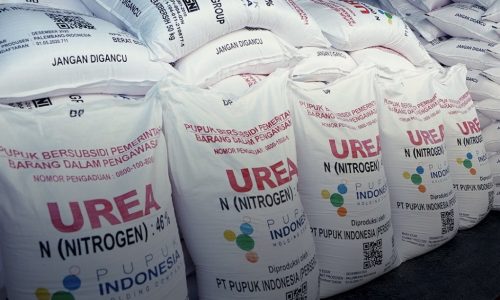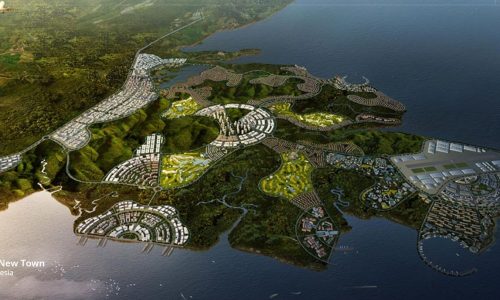The House of Representatives (DPR)’s intention to promote clean and renewable energy in a proposed bill has been “hijacked” by strong lobbies of coal industry and pro-nuclear parties, according to NGOs and experts. They said the bill has been strayed away from its real intention to promote renewable energy.
Director General of Renewable Energy at the Ministry of Energy and Mineral Resources, Dadan Kusdiana, said the government received the new and renewable energy (NRE) bills – or RUU EBET in Indonesian language – from the House. The government has 60 days to respond to the draft law.
“The bill is being deliberated by the ministry and government institutions as well as stakeholders,” he said, adding that the deadline for inputs from those institutions is on August 29, 2022.
Energy Minister Arifin Tasrif will discuss the bill with the House after finishing the discussion within government institutions and ministries. There are 14 chapters and 62 articles in the NRE draft law.
“Currently, the House is awaiting the president’s letter to set up a team comprising of both the government and the House members so they can discuss the list of issues to be brought to the plenary session for the deliberation,” Eddy Soeparno, Deputy Chairman of the House’s Commission VII overseeing Energy and Industry, said recently. He added that the House would pass the NRE bill by the end of the year.
New and renewable energy sources
Comprehensive renewable energy law is essential for Indonesia to create a climate for the development of renewable energy that is sustainable and equitable, according to Kusdiana. With the help of the new and renewable energy law, the government will be able to provide legal certainty, strengthen institutions and management, provide a conducive investment climate and provide renewable energy for industry development and national economic growth.
Lawmaker Sartono Hutomo of the House’s Commission VII said the bill includes several significant points, including government’s priority in developing renewable energy based on the targets set by the National Energy Policy. In addition, the government has standardized the renewable energy portfolio to ensure that renewable energy development can secure certainty on a level playing field.
A second aspect of the renewable energy policy is the provision of renewable energy prices to ensure investment and a return of investment for renewable energy industry as well as coordination and collaboration between the government and regional administrations regarding renewable energy management.
According to Article 30 of the bill, renewable energy sources include geothermal, wind, biomass, sunlight, water currents, waterfalls, agricultural and plantation waste, cattle waste, movement and different sea level temperatures. In addition to this category, the House also includes a new type of renewable energy.
Article 9 of the new energy and renewable energy bills stipulates that the new energy sources are nuclear, hydrogen, coal bed methane, coal liquefaction, coal gasification and other new energy sources. The bill defines new energy as any energy derived from or produced through a new technology processing renewable and non-renewable energy sources.
Coal industry lobbying power
However, several experts and environmentalists have suspected that fossil energies such as coal are sneaked into the bill.
An activist with the Indonesian Forum for the Environment (Walhi), Rere Jambore Christanto, said the NRE bill included many false solutions for energy transition, including fossil energy. The phony answer is due to the terminology of “new energy,” which is unknown in international renewable energy discussions.
“We usually think of renewable energy as energy derived from abundant resources that can be renewed and will always be available,” he said.
Coal derivative products in the bill would benefit the coal industry, which is a fossil energy source. The bill will perpetuate Indonesia’s use of dirty energy. Christanto said the new energy terminology used in the NRE bill is part of the fossil energy industry’s efforts to defend itself against the reality that fossil fuels are sunset industries at the international level.
“Essentially, they are trying to maintain the sector by sneaking articles about dirty energy during the energy transition,” he added.
There is a strong lobby within the House to include coal, nuclear and hydrogen into the NRE bill, according to Fabby Tumiwa, Executive Director of The Institute for Essential Services (IESR).
The Regional Representatives Council (DPD) had originally proposed the bill in 2018. Due to the law, the DPD may only offer it and cannot deliberate it, so the bill was taken over by the House as an initiative bill in 2019. The House discussed the renewable energy bill from 2014 to 2019 and then changed it to the NRE bill.
“I believe using the new energy bill is incorrect. Our goal is to increase renewable energy. We have abundant renewable energy sources but have yet to exploit them all. We need to replace fossil fuels and reduce carbon dioxide emissions,” Tumiwa said.
According to Salamudin Daeng, an expert in political economy, coal and natural resources, Indonesian oligarchs have strong lobby in political parties, the House and the government. The oligarchs placed their men in political parties or created their political parties.
“In the present time, we see infiltrators of political parties who have coal business, such as Erick Thohir, Sandiaga Uno, Aburizal Bakrie, Luhut Binsar Pandjaitan, and businessmen grouped in the Indonesian Chamber of Commerce and Industry (Kadin) and the Indonesian Young Entrepreneurs Association (HIPMI). The groups form part of the natural resource oligarch’s network,” Daeng said.
Melki Nahar from the Mining Advocacy Network (Jatam) said that individuals in coal industry business interests played a significant role in both the campaigns of incumbent President Joko Widodo and Vice President Ma’ruf Amin and contenders Prabowo Subianto and Sandiaga Uno. Candidates and their campaign teams have a close relationship with the coal industry.
“Most of their campaign funds were derived from the extractive industry, including coal,” Nahar said.
Jatam research indicates that 53% of the 575 House members have business affiliations with the extractive industry, including coal industry. For example, lawmaker Soeparno is a former finance director of Bakrie Group, owned by Aburizal Bakrie. Bakrie is a former chairman of the Golkar Party and the head of its advisory board.
“It means people who hold positions of political authority have a conflict of interest with their business, or they are using their business for the benefit of their political parties or groups,” Nahar explained.
Tumiwa suggested the government, specifically the energy ministry, to remove articles regarding new energy from the bill. Coal and nuclear provisions can be included in revising the coal and nuclear law.
“Consequently, the law can focus on developing and accelerating renewable energy ecosystems. So, the focus should be on creating the ecosystem and utilizing renewable energy,” he explained.
Bakrie and Brothers CEO Bobby Gafur Umar said that coal derivative products like coal gasification, coal liquefaction and coal bed methane become part of the new energy and renewable energy bill because they have low carbon emission and can be categorized as clean energy.
Pro nuclear group
The NRE bill regulates nuclear energy in addition to coal derivatives. According to Christanto, nuclear energy cannot be classified as new energy since nuclear technology has existed in Indonesia for a long time.
“The technology, however, is outdated. Since the 1960s, many countries have developed it,” he said.
Indonesia has also conducted nuclear research in the form of a small nuclear reactor. Using new energy is an effort to make dirty and clean energy appear the same, or what Christanto calls “greenwashing”.
Tumiwa noted that by including nuclear power in the NRE bill, the pro-atomic energy lobby has succeeded in pushing their agenda forward. “This is what I said: The bill has been hijacked. Fossil fuel groups and pro-nuclear organizations have hijacked the intentions of pro-renewable energy lawmakers to advance with their agendas,” he said.
According to Nanang Hamdani Basnawi, a member of the Indonesian Renewable Energy Society (METI-IRES), there is a lawmaker from the House’s Commision VII who supports nuclear energy. “The lawmaker brought nuclear energy to Indonesia from a Russian company,” he said, without giving further details.
Currently, Indonesia has Law No. 10/1997 on nuclear energy, according to Basnawi. A revised provision on nuclear energy should be included in the revision of the nuclear energy law. “It is essential that the Renewable Energy Law address hydropower, wind power plants, biomass and geothermal energy sources,” he said.
A senior researcher and former head of the National Nuclear Energy Agency (Batan), Djarot Sulistio Wisnubroto, disagreed with Basnawi. He said nuclear energy was classified as a new energy per Law No. 30/2007.
Indonesia has not yet implemented atomic energy as an operating power plant, even though nuclear energy is not a new technology and has been developed since the 1940s and 1950s. The inclusion of nuclear energy in the NRE bill results from its low carbon emissions. The carbon emissions of nuclear energy are even lower than those of gas as a fossil fuel. As a result, atomic energy is considered a clean energy source in European countries and Indonesia.
In the context of energy transition and the net zero emission target, Indonesia cannot rely solely on renewable energy because most renewable energy is intermittent or unreliable. Solar energy is one example of renewable energy influenced by the weather and the sun. It is also necessary for the industry to have a reliable and continuous energy source, such as coal-fired power plants.
“Nuclear energy can replace the position [of renewable energy],” Wisnubroto said.
As nuclear energy has a base load or can supply a minimum level of demand for two years, it can provide excellent power capacity to industry for two years. In addition, it emits low levels of carbon dioxide. “For this reason, the ministry of energy and mineral resources considers Indonesia to require nuclear energy by 2049,” he said.
Consequently, Indonesia will need 10 years to develop a nuclear power plant by 2049. Before introducing the new energy and renewable bill, the government should prepare the atomic infrastructure.









